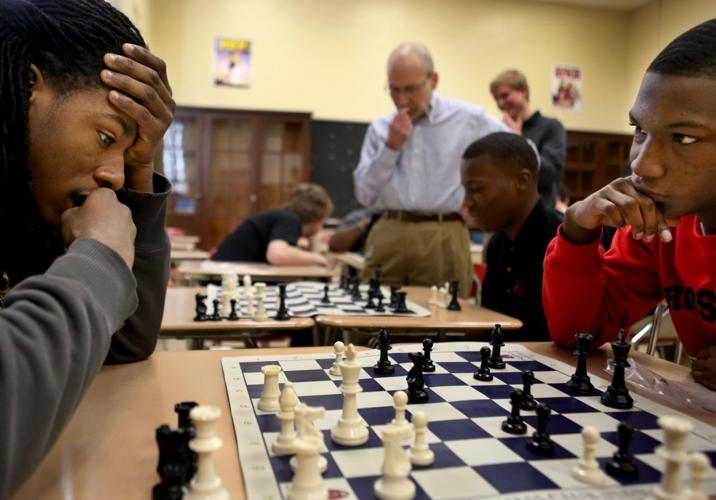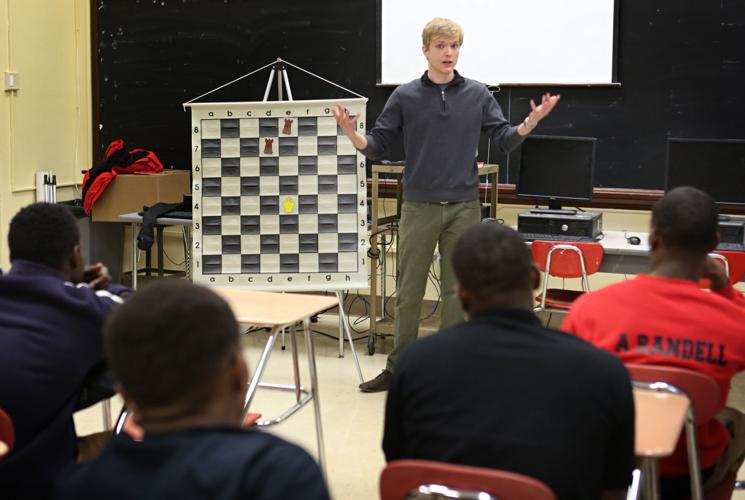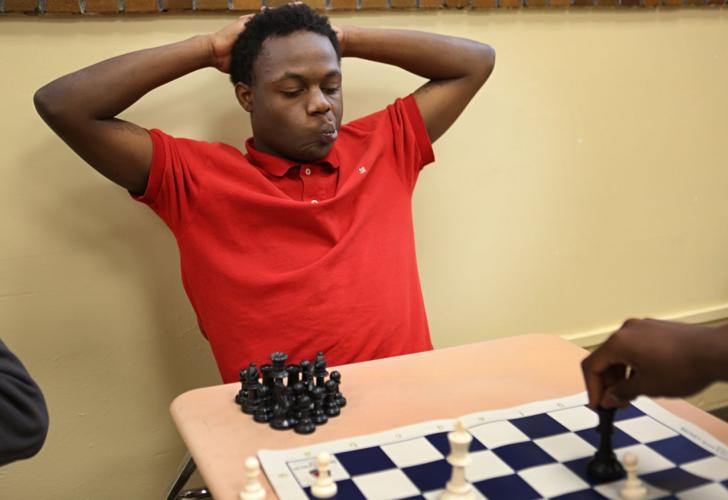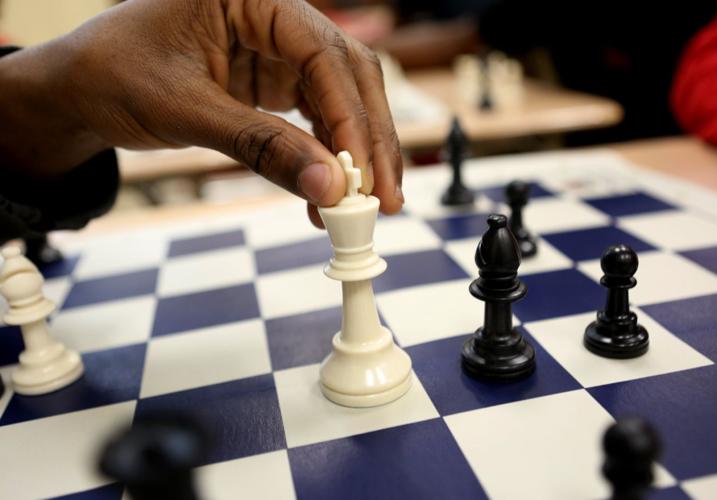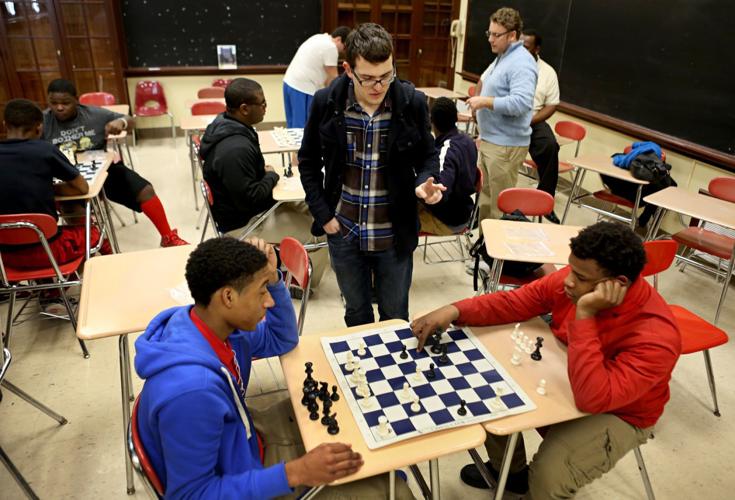When Coach DeAndre Campbell called his football players together after school this week at Roosevelt High School, some thought it was just a regular team meeting.
Then they saw the chess board diagram set up in the front of the classroom. The linebackers, a wide receiver and running back were getting ready to tackle the roles of the rook, bishop, pawn, knight, king and queen.
Think of it as an exercise for your minds, said Adam Gnuse, an instructor with the Chess Club and Scholastic Center of ║³└Ļ╩ėŲĄ, who came to Roosevelt this week to begin a weekly lesson for the team during the off-season.
ŌĆ£ItŌĆÖs not going to make you faster, itŌĆÖs not going to make you stronger, but it is great at increasing your mental endurance,ŌĆØ Gnuse told the team.
A few had played before. But for those who hadnŌĆÖt, the program, a partnership with the Demetrious Johnson Charitable Foundation, is the latest expansion of chess across ║³└Ļ╩ėŲĄ area schools during the last few years.
People are also reading…
Thousands of students are now learning and playing chess through extracurricular clubs or programs at 135 public, parochial or private schools in the ║³└Ļ╩ėŲĄ area. The Chess Club hosts classes at its Central West End building, but five years ago began growing its outreach program.
ItŌĆÖs not just students from elite private schools playing. Children in struggling urban districts, suburban elementary schools and learning disability programs are getting exposure to the game.
Teachers and parents say it helps children learn focus, problem-solving and patience as they analyze the configuration of pieces on the chessboard, skills that are missing from many video games or mindless screen time.
ŌĆ£B┤Ū┤Ū│Š! Boom!ŌĆØ junior Javon Robertson shouted triumphantly as he captured one of his opponentŌĆÖs pieces at Roosevelt.
Though there are schools with serious competitive chess teams in the ║³└Ļ╩ėŲĄ area, and regular tournaments hosted by the Gateway Chess League that pit schools against each other, the Chess ClubŌĆÖs outreach programs at schools are for mostly casual players who are still learning. There are no ratings, no prizes, no serious organization, just friendly rivalry over the board with fellow classmates, organizers say.
Campbell, the coach at Roosevelt, said having the football team play chess was about more than improving their performance on the field.
ŌĆ£We havenŌĆÖt had anything like this before,ŌĆØ he said. ŌĆ£ItŌĆÖs a great deal for us and our guys because itŌĆÖs going to help them in class and in life as well.ŌĆØ
Playing chess has been linked to higher academic achievement, with some studies showing increased scores on standardized tests in reading and math. The Chess Club and Scholastic Center has begun collecting its own data to research the outcomes for area schoolchildren.
ŌĆ£YouŌĆÖre putting your mind against someone elseŌĆÖs mind,ŌĆØ said Matt Barrett, scholastic coordinator at the Chess Club. ŌĆ£ThereŌĆÖs some ego involved there, but there is also some sportsmanship involvement and how to be careful and plan your moves.ŌĆØ
The explosion of chess in local schools follows ║³└Ļ╩ėŲĄŌĆÖ rise to prominence in the chess scene both nationally and internationally.
Investor Rex Sinquefield is the president and chairman of the organization, which in April will host the United States Chess Championship for the seventh year in a row. The club has attracted some of the worldŌĆÖs top players.
Jan Zinsser started a club at McGrath Elementary in Brentwood five years ago after her son played chess at the organizationŌĆÖs Central West End campus.
After school, students as young as age 6 play chess twice a week. The club at McGrath has a waiting list to join.
ŌĆ£Not every kid is a sports player or musical. We needed something else,ŌĆØ Zinsser said. ŌĆ£I think you have to catch them young.ŌĆØ
Parents pay about $7 a week for their child to participate, with one day consisting of a lesson from the teacher and the other a practice day. The club also offers scholarships so that every child can play, even if parents canŌĆÖt afford the cost.
With tight budgets, most of the chess programs such as the one at McGrath must support themselves financially. Other programs are donated or have corporate sponsors, such as a new $7,500 pledge from UMB supporting eight classrooms for nine weeks at KIPP Victory Academy, a charter school in the city.
A few schools are considering moving chess into the regular school day, so that all students get a chance to learn to play and the added academic benefits.
Some have introduced chess as part of math or their in-school study skills sessions, similar to the philosophy embraced by other countries. Spain, for example, is moving toward a chess requirement in the curriculum for the countryŌĆÖs schools.
On a recent day at McGrath Elementary, fifth-graders Jonas Wall and Corinne Fox played each other during the club.
ŌĆ£Every time you play, itŌĆÖs different,ŌĆØ Wall said. ŌĆ£You canŌĆÖt always do the same thing.ŌĆØ
At Roosevelt, William Brown and Marquise Quinn called on Gnuse a few times with questions as they played, checking which way different pieces could move. Quinn had played before, and it was the first time for Brown after the first quick introductory lesson.
ŌĆ£ItŌĆÖs cool to get you thinking,ŌĆØ Brown said, ŌĆ£even though I have no idea what IŌĆÖm doing.ŌĆØ







